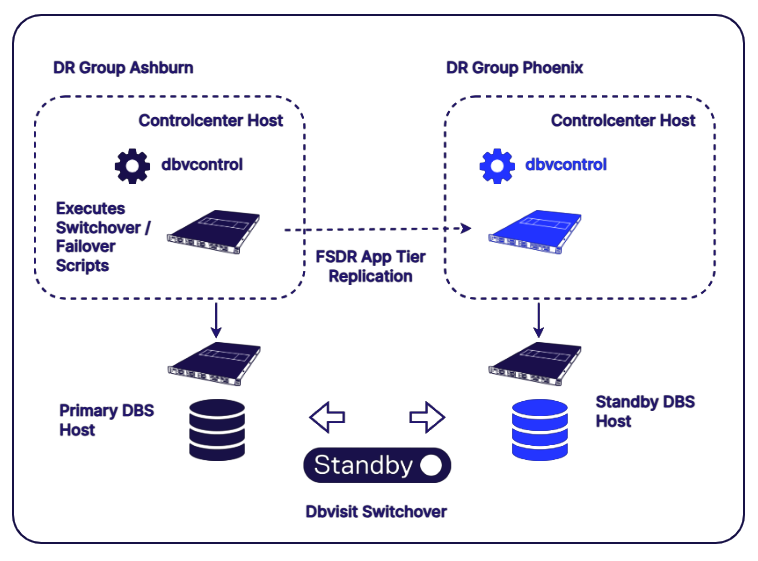Automate while Optimizing Database Costs by Leveraging Standby MultiPlatform (StandbyMP) to bring Oracle SE, SQL Server and PostgreSQL support to Oracle Full Stack DR (FSDR).
In a world where data is king, ensuring its database safety and accessibility is paramount for businesses. Today, we are thrilled to introduce a game-changing enhancement to our Standby MultiPlatform Disaster Recovery (DR) Software - Full Support for Oracle FSDR. This integration fortifies and extends Oracle FSDR to additional platforms, including Oracle SE, Microsoft SQL Server, and soon, PostgreSQL.
Why Disaster Recovery in the Cloud Matters
As businesses increasingly evaluate cloud service provider platforms, the importance of DR remains paramount. While the cloud offers numerous benefits, it does not exempt organizations from potential risks and disruptions. Here's why disaster recovery continues to be a critical consideration in the cloud environment:
-
Mitigating Unforeseen Outages: Cloud service providers, despite their robust infrastructure, are not immune to outages. Service disruptions can occur due to hardware failures, network issues, or even natural disasters. A well-designed disaster recovery strategy ensures business continuity by swiftly recovering data and applications in the face of these unforeseen events.
-
Protecting Against Data Loss: Cloud platforms provide advanced data redundancy and backup capabilities, but they do not eliminate the risk of data loss entirely. Human errors, malicious activities, or software glitches can compromise critical data. Disaster recovery solutions act as a safety net, enabling organizations to restore lost data and maintain data integrity.
-
Addressing Security Concerns: With the rising threat of cyberattacks, security is a top priority for businesses in the cloud. A comprehensive disaster recovery plan not only helps recover from security breaches but also includes measures to prevent unauthorized access and secure sensitive information, minimizing the impact of potential security incidents.
-
Meeting Compliance Requirements: Many industries have stringent regulatory compliance standards that mandate data protection and recovery measures. A robust disaster recovery plan ensures that organizations meet these regulatory requirements, avoiding legal consequences and safeguarding their reputation.
-
Ensuring Rapid Recovery: The cloud's scalability and flexibility are invaluable assets, but they also come with increased complexity. A well-orchestrated disaster recovery plan tailored for cloud environments ensures rapid recovery with minimal downtime, meeting strict recovery time objectives (RTOs) and recovery point objectives (RPOs).
What is Oracle Full Stack Disaster Recovery
FSDR is a DR orchestration solution within Oracle Cloud Infrastructure (OCI) that provides comprehensive DR management capabilities for all layers of an application stack - infrastructure, database, application, middleware, etc. It offers comprehensive solutions for safeguarding businesses against unforeseen disruptions and data loss. This robust DR system ensures continuity and resilience in the face of adverse events. Key features include:
-
Real-time Replication: Oracle's DR solution supports real-time data replication, minimizing potential data loss and allowing for rapid recovery in the event of a disaster.
-
Automated Failover: The system includes automated failover mechanisms, enabling swift and seamless transitions to secondary systems or data centers without manual intervention. This reduces downtime and accelerates the restoration of services.
-
Integrated Solutions: Oracle provides an integrated stack of tools and technologies for disaster recovery, covering databases, applications, and infrastructure. This holistic approach ensures a cohesive and streamlined recovery process
-
Comprehensive Testing: Regular testing is facilitated to ensure the effectiveness of the DR plan. This feature allows organizations to validate their readiness and identify potential gaps in the recovery process.
-
Single pane-of-glass: FSDR normalizes the way DR operations are executed and monitored for vastly different business systems using a single pane of glass.
For more detailed information on FSDR, you can check out the documentation here.
Dbvisit StandbyMP: Expanding Horizons for FSDR
Dbvisit StandbyMP has long been at the forefront of Oracle database DR. Now, with its seamless integration into FSDR, it enables seamless DR management for additional database platforms including Oracle Standard Edition, Microsoft SQL Server and PostgreSQL.
In the event of a disaster, Oracle FSDR can orchestrate failover processes, seamlessly transitioning operations to the standby database managed by Dbvisit StandbyMP. This tandem approach ensures that not only applications and infrastructure are resilient, but the critical database layer is also protected. With features such as automated failover, real-time data replication, and support for point-in-time recovery, Dbvisit StandbyMP complements Oracle FSDR by fortifying the database tier and contributing to the overall robustness of the organization's DR strategy.
By bringing support for Oracle SE, SQL Server and PostgreSQL databases, organizations can realize further benefits including ease of use, architecture consolidation, and cost rationalization. Cost savings can be achieved for users by choosing the optimal database platform and edition for their performance and security needs while achieving the high resilience provided by the standby database.

Elevate Your Disaster Recovery Strategy Today
The integration of Dbvisit StandbyMP with Oracle’s FSDR marks a significant leap forward in the world of data protection. With the added support for various database platforms, organizations can now enjoy a unified and versatile DR solution that adapts to their evolving needs.
To learn more about Dbvisit StandbyMP and its integration with Oracle Full Stack Disaster Recovery, contact our experts today for a POC / demo.

Subscribe to our monthly blog updates
By subscribing, you are agreeing to have your personal information managed in accordance with the terms of DBVisit's Privacy Policy
Tags: Cloud, New Release











